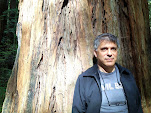I shared my
story of the first day of our start-up news service in Honolulu last week. But then the week got away from me and I didn't have a chance to serve up any impressions from the rest of the week.
First, you know how people sometimes complain that newsrooms today are too much like insurance offices. Well, I think this close-up shot by Peer News President and staff photographer Randy Ching gives a hint of how pleasantly informal life is in our offices. T-shirts, jeans and slippers are just fine.
While the scene is informal, the atmosphere is serious. On Tuesday, Randy and Pierre opened the kimono on the company's business plan to a degree I'd never experienced at a media company. I've been around a lot of conversations with staff regarding the business of journalism, but this was unlike anything I'd ever seen. We're building a team where individuals understand what's at stake and will have the information to evaluate how we're doing.
Here's a portrait of the team Randy (the guy standing with the wine glass on his T-shirt) took Friday.
Standing from left: Pierre Omidyar, Treena Shapiro, Mike Levine, Chad Blair, Mark Quezada, Randy Ching, Ryan Kanno and me.
Seated: Katherine Nichols, Noelle Chun, Katherine Poythress and Sara Lin.
After two days of structured training, we started daily story brainstorming sessions followed by what we call beat meetings. At these meetings, we met individually with each reporter-host to go over his or her area of responsibility and talk about it in greater depth. We also began talking about specific "topic pages," the building block of our news service. The first pages they started building are what we're calling structural topic pages, things you'd need to know before you can frame any related issues. So, for example, how government is structured and how it works. Where the money comes from and where it goes. Or who owns the land in Hawaii and who regulates it. That might sound a bit like the stuff of civics class, and it is, but we want to do the work for our members so they don't have to go digging through piles of data to find what they're looking for. What we're doing isn't just data collection, although there's some of that. It's connecting the dots for people so they can focus on an issue at hand but quickly grasp context if they need it.
This sounds a lot easier than it is. I had done some work with our first intern, Daniel Ikaika Ito, to learn what it would take to build these pages. So I knew it wouldn't be easy. And it wasn't. It's difficult for accomplished people who are used to going out and jumping on stories to have to step back and do this kind of basic reporting and writing. The amount of material available quickly becomes overwhelming, and our point is not to overwhelm our members. The best thing I heard was when one reporter-host said that this was what a journalist should do when starting any new job. It ensures that they're familiar with the foundation of what they're covering. This coming week we'll start identifying issues for which we'll build topic pages as well. Those, in our lingo, will be issue topic pages.
By the end of the week we were ready for a "pau hana" (after work drink). Which we did right in our office. We had joked about the staff having to do skits on the first day. Never happened. Although we did have some fun playing a few games - we broke into groups to quickly learn what was the most interesting thing we had in common (my team won dark chocolate - I still haven't received mine, though, Randy) because we'd all lived with grandparents for part of our childhood. By Friday, we had loosened up enough that we were ready to tell stories. Randy caught Mike Levine telling the story of his most memorable hike on Kauai. Amazing.
At a start-up, it's hard not to feel like you're not in a race with time. We want our service to go live as soon as possible. That means we have a lot to do. It's intense. And new. Which can raise the anxiety level. But it's also fun. Or at least we want it to be.
I'll let you know more down the road. But last week was a big step in our march to screens near you...







